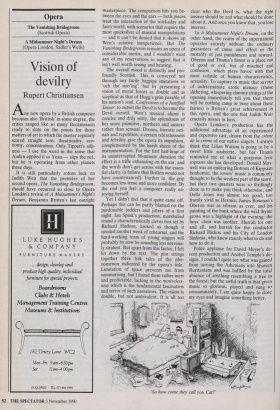Opera
Vision of devilry
Rupert Christiansen
Any new opera by a British composer becomes also 'Brittish' in some degree, the critics ranged like so many Beckmessers ready to slate on the points for those matters of art in which the master regularly scored straight tens: theatricality, eco- nomy, concentration. Only Tippett's silli- ness — I use the word in the sense that Auden applied it to Yeats — slips the net, but he is operating from other planets these days.
It is still particularly rotton luck on Judith Weir that the premiere of her second opera, The Vanishing Bridegroom, should have occurred so close to Opera Londdn's revival of A Midsummer's Night's Dream, Benjamin Britten's last outright masterpiece. The comparison hits you be- tween the eyes and the ears — both pieces treat the interaction of the workaday and faery world, with scenarios that require the most quicksilver of musical manipulations — and it can't be denied that it shows up Weir's relative inexperience. But The Vanishing Bridegroom remains an opera of considerable merits, and I wouldn't want any of my reservations to suggest that it isn't well worth seeing and hearing.
The overall mood is distinctly and pro- foundly Scottish. This is conveyed not through any facile bagpipe imitations or `och the noo'ing', but by presenting a vision of moral forces as double and as sceptical as that of Hogg's grim parable of his nation's soul, Confessions of a Justified Sinner: to outwit the Devil is to become the Devil ourself. Weir's musical idiom is concise and drily witty, the splendours of her score primitive, northern and austere rather than sensual. Drones, hieratic osti- nati and repetition, a certain relentlessness and febrility give the opera its impulsion, complemented by the harsh sheen of the instrumentation. For the first half-hour of its uninterrupted 90-minute duration the effect is a trifle exhausting on the ear, and the words don't get across with the essen- tial clarity (a failure that Britten would not have countenanced). Further in, the grip becomes less tense and more confident. By the end you feel a composer really en- joying herself.
Yet I didn't feel that it quite came off. Perhaps this can be partly blamed on the pardonable judders and jitters of a first night: Ian Spink's production, marshalled round a characteristically clever box set by Richard Hudson, looked as though it needed another week of rehearsal, and the hard-working team of young singers will probably by now be sounding less nervous- ly strident. But apart from this factor, I felt let down by the text. The plot strings together three folk tales of the phe- nomenon indicated by the opera's title. Limitation of space prevents me from summarising, but I found them rather inert and predictable, lacking in the motiveless- ness which is the fundamental fascination and terror of such narratives. The vision is double, but not ambivalent. It is all too clear who the Devil is, what the right answer should be and what should be done about it. And once you know that, you lose interest.
In A Midsummer Night's Dream, on the other hand, the realm of the supernatural operates entirely without the ordinary guarantees of cause and effect or the morality of just punishment and reward. Oberon and Titania's forest is a place not of good or evil, but of mischief and confusion, which plays havoc with that most volatile of human characteristics, sexuality. To capture in music that savour of indeterminate erotic menace (those slithering, whispering clammy strings at the opening immediately tell you that there will be nothing camp or twee about these fairies) is Britten's great achievement in this opera, and the one that Judith Weir crucially misses in hers.
Opera London's production has the additional advantage of an experienced and expensive cast, drawn from the creme de la creme of our native singers. I always think that Lilian Watson is going to be a sweet little soubrette, but her Titania reminded me of what a gorgeous lyric soprano she has developed; Donald Max- well was an endearing Bottom of Kippsian bonhomie; the lovers' music is commonly thought to be the weakest part of the score, but their two quartets were so thrillingly done as to make you think otherwise, and Della Jones was almost too good, too fruitily vivid as Hermia; James Bowman's Oberon was as vibrant as ever, and his painting of the bank where the wild thyme grows was a highlight of the evening; the boys' choir was another. Hurrah for one and all, and hurrah for the conductor Richard Hickox and his City of London Sinfonia, who knew exactly what to do and how to do it.
Polite applause for David Meyer's de- cent production and Anabel Temple's de- signs. I couldn't quite see what was gained from turning the Athenians into Shavian Ruritanians and was baffled by the total absence of anything resembling a tree in the forest; but the awful truth is that given music so glorious, played and sung so consummately, I am quite happy to close my eyes and imagine something better.
`So how come they call you Cat?'


































































 Previous page
Previous page